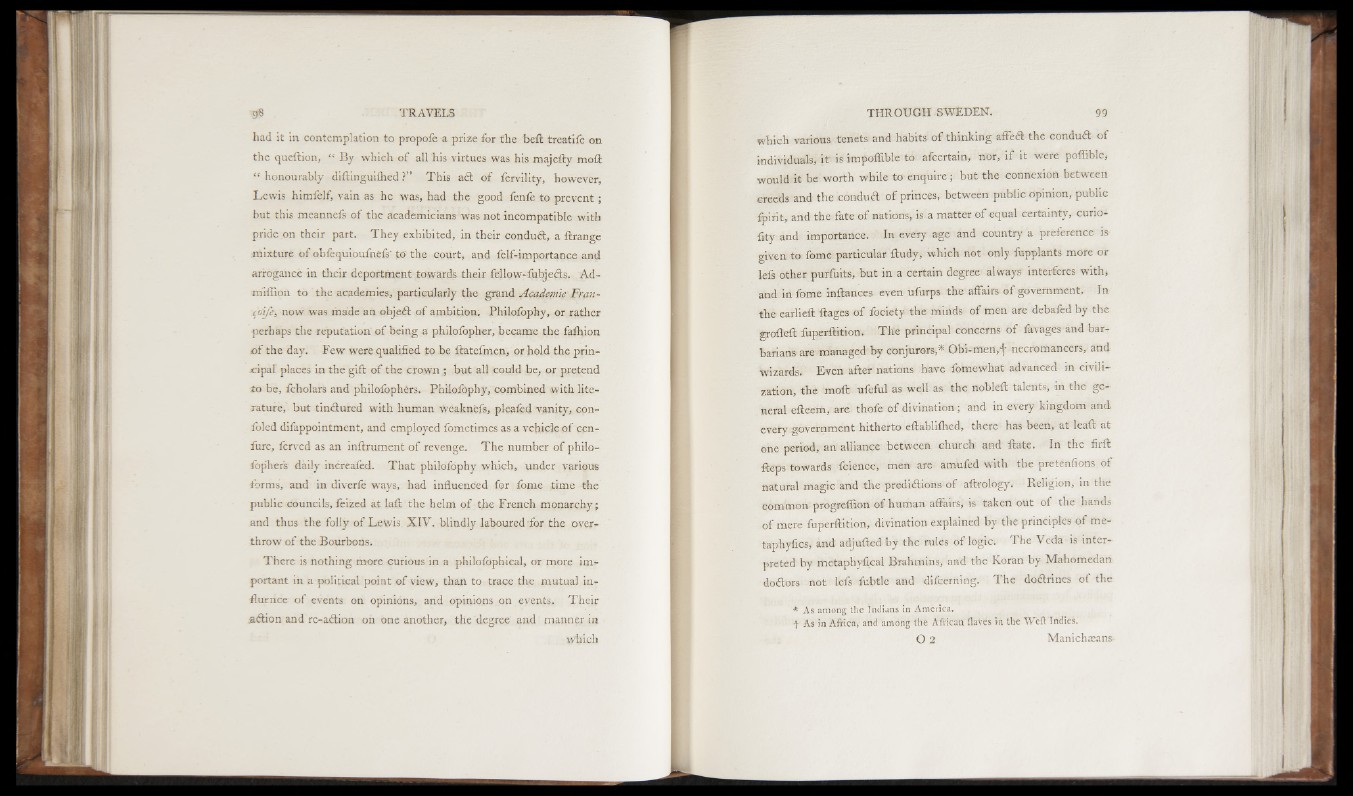
had it in contemplation to propofe a prize for the beft treatife on
the queftion, “ By which o f all his virtues was his majefty moil
“ honourably diftinguiihed ?” This a ft o f fervility, however,
Lewis himfelf, vain as he was, had the good fenfe to prevent;
but this meannefs o f the academicians was not incompatible with
pride on their part. They exhibited, in their conduit, a Arrange
mixture o f obfequioufnefs' to the court, and felf-importance and
arrogance in their deportment towards their fellovv-fubjects. Ad-
mifiion to the academies, particularly the grand Academic Fran-
co'ife, now was made an objeil o f ambition; Philolophy, or rather
perhaps the reputation o f being a philofopher, became the faihion
o f the day. Few were qualified to be ftatefmen, or hold the principal
places in the gift o f the crown ; but all could be, or pretend
to be, fcholars and philolophers. Philolbphy, combined with literature,
but tinctured with human weaknels, pleafed vanity, cpn-
foled difappointment, and employed fometimes as a vehicle o f cen-
fure, ierved as an initrument o f revenge. T he number o f philo-
fophers daily increaied. T ha t philofophy which, under various
terms, and in diverfe ways, had influenced for fome time the
public councils, feized at lafl the helm o f the French monarchy;
and thus the folly o f L ewis X IV . blindly laboured for the overthrow
o f the Bourbons.
There is nothing more curious in a philofophical, or more important
in a political point o f view, than to trace the mutual influence
o f events on opinions, and opinions on events. Their
action and r o action on one another, the degree and manner in
which
which various tenets and habits o f thinking affect the conduit o f
individuals, it is impoffible to afcertain, nor, i f it were poffible,
would it be worth while to enquire; but the connexion between
creeds and the conduct o f princes, between public opinion, public
fpirit, and the fate o f nations, is a matter o f equal certainty, curio-
fity and importance. In every age and country a preference is
given to fome particular itudy, which not only fupplants more or
leis other purfuits, but in a certain degree always interferes with,
and in fome inftances even ufurps the affairs o f government. In
the earlieft ftages o f fociety the minds o f men are debafed by the
grofleft fuperftition. T he principal concerns o f favages and barbarians
are managed by conjurors-,* Obi-med,-j' necromancers, and
wizards. Even after nations have fcmewhat advanced in civilization,
the moft ufeful as well as the nobkft talents, in the general
efteem, are thofe o f divination; and in every kingdom and
every, government hitherto eftabliihed, there has been, at leaft at
one period, an alliance between, church and ftate. In the firft
fteps towards fcience, men are amufed with the pretenfions of
natural magic and the predictions o f aftrology. Religion, in the
common progreffion o f human affairs, is taken out o f the hands
o f mere fuperftition, divination explained by the principles o f me-
taphyfies, and adjufted by the rules o f logic; The Veda is interpreted
by metaphyfical Brahmins, and the Koran by Mahomedan
doctors not lefs fubtle and difcerning. T he doctrines o f the
* As among the Indians in America.
f As in Africa, and among the Afiican ilaves in the Weil Indies.
O 2 Mamchasans